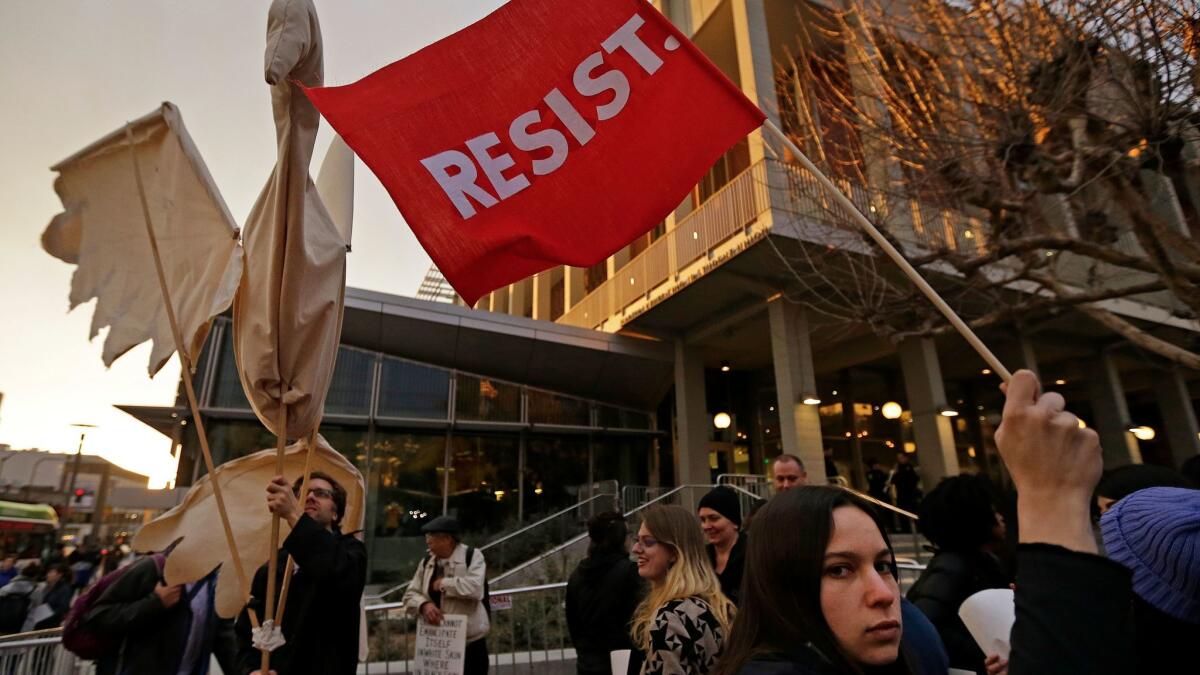Op-Ed: Free speech is a virtue. Spending millions to enable hatred isn’t

- Share via
On Dec. 9, 1964, Mario Savio and the original Free Speech Movement claimed victory in Berkeley:
“We’ve finally gotten into a position where we have to consider being responsible, because now we have the freedom within which to be responsible. And I’d like to say at this time, I’m confident that the students and faculty at the University of California will exercise their freedom with the same responsibility they’ve shown in winning their freedom.”
That’s a sentiment you will scarcely hear from those at UC Berkeley who now take “free speech” as their cause. Their marquee event, Free Speech Week, is scheduled to start Sunday, although the slate of speakers and the events themselves remain unconfirmed. As this hurricane approaches landfall on campus, Berkeley is bracing itself for calamity — for provocation, not illumination. And at a high cost.
Free Speech Week has never been about what its name proclaims, but rather about normalizing hate speech. The event organizers want to be allowed to bring chaos to campus but not to bear the costs. There is nothing noble in this endeavor.
Free Speech Week has never been about what its name proclaims, but rather about normalizing hate speech.
The whole debacle has been crafted by a mere handful of students. The organization leading the charge, an online publication called the Berkeley Patriot, is a revived version of the California Patriot, which has not been truly active on campus in years. The blog — with just five posts as of Thursday — seems to exist primarily to bring Free Speech Week into reality. It’s a tool for reserving “student event” space on campus; its members are puppets whose strings Milo Yiannopoulos is pulling from miles away. Together, they have engineered a potential disaster and forced the university to deal with the repercussions.
Berkeley faces real challenges and they have nothing to do with a fake crisis in intellectual freedom. The campus brims with brilliant staff and administrators who, in recent months, have found themselves at a standstill, unable to make progress because they are burdened with the free speech situation. In defense of fairness — and out of fear of being sued — they’ve been cornered into “hosting” events that drain the school’s budget and decimate its spirit.
To the dismay of student government, for example, the university, already saddled with multimillion-dollar debt, has somehow managed to come up with more than $1 million to spend on security for free speech events. Yet it couldn’t (or wouldn’t) fund emergency housing to alleviate student homelessness, or pay to add personnel to a badly understaffed financial aid office.
As for the students, we’ve been treated to hyper-militarized campus life. Classes have been canceled, resource centers shuttered. The presence of hundreds of riot-ready officers from all over the region has transformed the school into a war zone. Hateful, discriminatory messages appear, night after night, in chalk on Sproul Plaza and posters plastered on campus walls and bulletin boards. Students are staying home for fear of being targeted by provocateurs for their religion, race or gender identity, or of being caught up in protests that don’t stay peaceful.
It is all but certain that Free Speech Week, if it actually proceeds, will provide no substantive discourse worth the costs that this community has had to bear. No one’s words, delivered from Savio Steps or anywhere else, will be so intrinsically valuable as to undo the damage done here.
The 1st Amendment protects the rights of everyone to be heard. But there is a distinction between “could” and “should,” between the legal right to do something and doing the right thing. That distinction wasn’t lost on Mario Savio, as it seems to be on today’s supposed champions of free speech.
Rigel Robinson is the vice president for external affairs of the Associated Students of the University of California. He is a senior studying political economy.
Follow the Opinion section on Twitter @latimesopinionand Facebook
More to Read
A cure for the common opinion
Get thought-provoking perspectives with our weekly newsletter.
You may occasionally receive promotional content from the Los Angeles Times.





